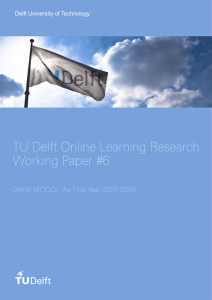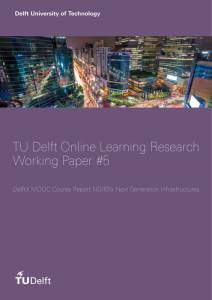Posted in May 2015
Working Paper 4: Introduction to Credit Risk Management 2014
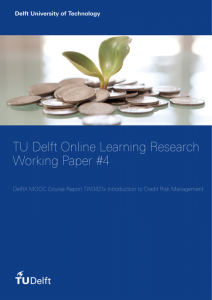 This report is to give more insight in the background, the implementation of the course and the results. The purpose is to provide useful information (and clean data) to the team of developers and teachers and to others to support their aspiration to improve online education. A comparative analysis of the first five DelftX MOOCs can be found in the ‘Working Paper DelftX MOOCs, the first year (2013-2014)’.
This report is to give more insight in the background, the implementation of the course and the results. The purpose is to provide useful information (and clean data) to the team of developers and teachers and to others to support their aspiration to improve online education. A comparative analysis of the first five DelftX MOOCs can be found in the ‘Working Paper DelftX MOOCs, the first year (2013-2014)’.
Working Paper 3: Introduction to Aeronautical Engineering 2014
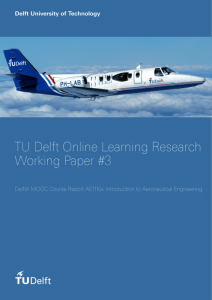 This report is to give more insight in the background, the implementation of the course and the results. The purpose is to provide useful information (and clean data) to the team of developers and teachers and to others to support their aspiration to improve online education. A comparative analysis of the first five DelftX MOOCs can be found in the ‘Working Paper DelftX MOOCs, the first year (2013-2014)’. Continue reading
This report is to give more insight in the background, the implementation of the course and the results. The purpose is to provide useful information (and clean data) to the team of developers and teachers and to others to support their aspiration to improve online education. A comparative analysis of the first five DelftX MOOCs can be found in the ‘Working Paper DelftX MOOCs, the first year (2013-2014)’. Continue reading
Working Paper 2: Introduction to Water Treatment 2013
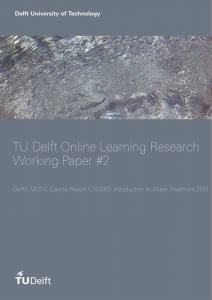 This report is to give more insight in the background, the implementation of the course and the results. The purpose is to provide useful information (and clean data) to the team of developers and teachers and to others to support their aspiration to improve online education. A comparative analysis of the first five DelftX MOOCs can be found in the ‘Working Paper DelftX MOOCs, the first year (2013-2014)’. Continue reading
This report is to give more insight in the background, the implementation of the course and the results. The purpose is to provide useful information (and clean data) to the team of developers and teachers and to others to support their aspiration to improve online education. A comparative analysis of the first five DelftX MOOCs can be found in the ‘Working Paper DelftX MOOCs, the first year (2013-2014)’. Continue reading
Working Paper 1: Solar Energy 2013
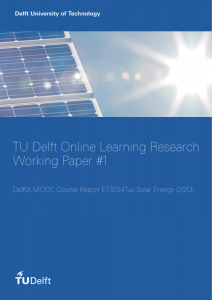 This report is to give more insight in the background, the implementation of the course and the results. The purpose is to provide useful information (and clean data) to the team of developers and teachers and to others to support their aspiration to improve online education. A comparative analysis of the first five DelftX MOOCs can be found in the ‘Working Paper DelftX MOOCs, the first year (2013-2014)’. Continue reading
This report is to give more insight in the background, the implementation of the course and the results. The purpose is to provide useful information (and clean data) to the team of developers and teachers and to others to support their aspiration to improve online education. A comparative analysis of the first five DelftX MOOCs can be found in the ‘Working Paper DelftX MOOCs, the first year (2013-2014)’. Continue reading
EMOOCs 2015: Experiences from 18 DelftX MOOCs
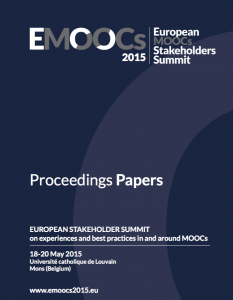 Paper presented at the European Stakeholders summit on experiences and best practices in and around MOOCs in Mons, Belgium (18-20 May 2015).
Paper presented at the European Stakeholders summit on experiences and best practices in and around MOOCs in Mons, Belgium (18-20 May 2015).
Abstract
This paper describes experiences and lessons learned from developing, building and running 18 MOOCs (including 4 reruns) at the Delft University of Technology, namely the selection of courses, the design, development and delivery of courses, innovative educational elements for use in online and in residential teaching, and the generation of data. Overall the development and offering of MOOCs has augmented the awareness, expertise, and innovation regarding online and residential learning, and has contributed to an active and positive spirit of educational innovation. In addition, we saw indications of a positive effect on quality and quantity of enrolment for on-campus programs, gathered data for research and were able to share the university’s knowledge with the world.
Reference
Kiers, J., Jorge, N., (2015). Experiences from 18 DelftX MOOCs in Proceedings Paper EMOOCs 2015 (page 65-70): http://www.emoocs2015.eu/sites/default/files/Papers.pdf
EMOOCs2015: Reconsidering Retention in MOOCs: the Relevance of Formal Assessment and Pedagogy
 Paper presented at the European Stakeholders summit on experiences and best practices in and around MOOCs in Mons, Belgium (18-20 May 2015).
Paper presented at the European Stakeholders summit on experiences and best practices in and around MOOCs in Mons, Belgium (18-20 May 2015).
Abstract
The motivation to enrol in a MOOC is more diverse than the motivation for a conventional course. This diversity requires re-conceptualization of the terms for enrolment, participation, and achievement. The paper addresses the concept of retention and focuses on engagement relative to assessment. Student retention is often used to determine the value of higher education. In this paper we argue that retention data about specific groups of students
can supply valuable insights to improve MOOC design and align expectations. The paper reports three short studies conducted to gain insights into disengagement from assessment, based on the data gathered in the first five DelftX MOOCs. The empirical part of the paper demonstrates that retention rates in relation to formal assessment vary from course to course. In the analysed case, fewer learners disengaged from the formal assessment in the course with highest degree of student autonomy, high learning support and scaffolds. Consistently across courses, learners who received lower grades on the first assessment task, tend to disengage from further assessment.
Reference
De Vries, P., Hennis, T., Skrypnyk, A., (2015). Reconsidering Retention in MOOCs: the Relevance of Formal Assessment and Pedagogy in Proceedings Paper EMOOCs 2015 (page 168-173): http://www.emoocs2015.eu/sites/default/files/Papers.pdf

